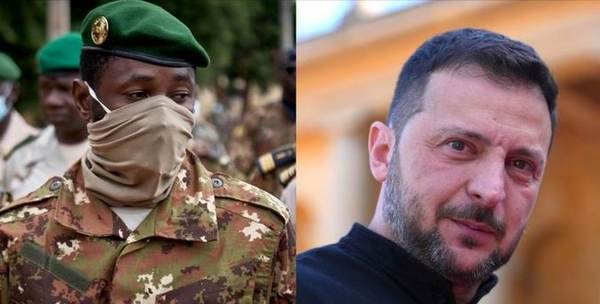- Details
- Headlines
Ukraine Condemns Mali’s Diplomatic Break Over Rebel Attack Allegations
In a development straining international relations, Ukraine on Monday, August 5, criticized Mali’s abrupt decision to sever diplomatic ties, denouncing it as both short-sighted and hasty.

Kyiv contended that Mali had provided no evidence to substantiate allegations implicating Ukraine in last month's violent clashes that resulted in the deaths of Malian soldiers and Russian mercenaries.
Mali's announcement came on Sunday, declaring an immediate end to diplomatic relations with Ukraine following statements from Ukraine’s military intelligence agency regarding the late July skirmishes in northern Mali.
The conflict, attributed to Tuareg rebels, saw the group claim responsibility for killing at least 84 Russian Wagner mercenaries and 47 Malian soldiers. This encounter is viewed as Wagner's most significant defeat since they began assisting Mali's military against insurgent factions two years ago.
"It is regrettable that Mali decided to sever relations without thoroughly examining the facts and circumstances of the incident and without providing any evidence of Ukraine's involvement," the Ukrainian foreign ministry said in a statement.
Post-clash remarks by Andriy Yusov, a spokesperson for Ukraine's military spy agency, on national television suggested that Malian rebels had received the "necessary" intelligence to execute the attack. Despite this, Ukraine's official stance did not confirm its involvement, reiterating its primary focus on defending against Russian forces since the onset of Russia’s full-scale invasion over 29 months ago.
Mali, interpreting Yusov’s comments as an implicit admission, expressed "deep shock" and condemned the remarks as violations of its sovereignty, equating them to support for international terrorism.
The diplomatic fallout extended over the weekend, with Senegalese authorities summoning Ukraine’s ambassador, Yurii Pyvovarov, over a now-deleted video posted on the Ukrainian embassy’s Facebook account, which they claimed supported the attack.
These accusations emerge amidst deteriorating relations between Western nations and the politically unstable Sahel region. Following recent military coups in Mali, Burkina Faso, and Niger, the newly established juntas have expelled French and U.S. forces, opting instead for security assistance from Russian mercenary groups.
The diplomatic rift underscores a broader geopolitical realignment in the Sahel, raising concerns about the increasing influence of Russian paramilitary forces in the region and the potential implications for regional stability and international security partnerships.
- Details
- News Team
- Hits: 908
Local News
- Details
- Society

Kribi II: Man Caught Allegedly Abusing Child
- News Team
- 14.Sep.2025
- Details
- Society

Back to School 2025/2026 – Spotlight on Bamenda & Nkambe
- News Team
- 08.Sep.2025
- Details
- Society

Cameroon 2025: From Kamto to Biya: Longue Longue’s political flip shocks supporters
- News Team
- 08.Sep.2025
- Details
- Society

Meiganga bus crash spotlights Cameroon’s road safety crisis
- News Team
- 05.Sep.2025
EditorialView all
- Details
- Editorial

Robert Bourgi Turns on Paul Biya, Declares Him a Political Corpse
- News Team
- 10.Oct.2025
- Details
- Editorial

Heat in Maroua: What Biya’s Return Really Signals
- News Team
- 08.Oct.2025
- Details
- Editorial

Issa Tchiroma: Charles Mambo’s “Change Candidate” for Cameroon
- News Team
- 11.Sep.2025
- Details
- Editorial





